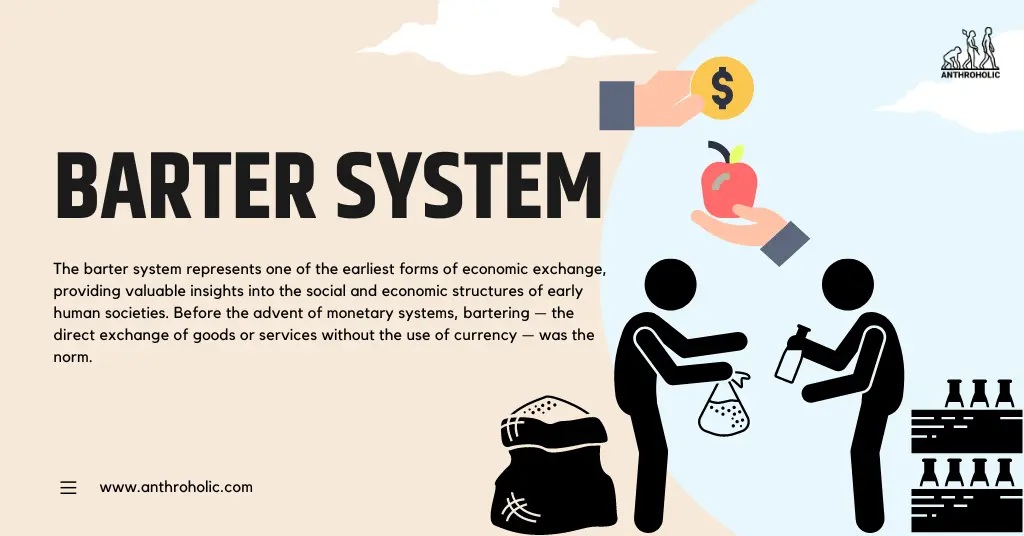AI Answer Evaluation Platform Live Now. Try Free Answer Evaluation Now
Barter System
The barter system represents one of the earliest forms of economic exchange, providing valuable insights into the social and economic structures of early human societies. Before the advent of monetary systems, bartering — the direct exchange of goods or services without the use of currency — was the norm [1]. To explore the barter system, it’s important historical implications, significance, and limitations from an anthropological viewpoint.

Historical Context of the Barter System
Early Emergence of Bartering
Historically, bartering emerged as early as 6000 BC within Mesopotamia, subsequently extending to cultures like the Egyptians, who used it to trade along the Nile [2]. These initial barter transactions were essentially bilateral, requiring the coincidence of wants.
Bartering in Different Cultures
Different cultures had unique commodities for exchange, reflecting their societal values and resources. For example, Native Americans traded shells called wampum [3], while in ancient China, spices and tea were common bartering items [4].
Table 1: Common Bartering Items in Different Cultures
| Culture | Common Bartering Items |
|---|---|
| Native Americans | Wampum (shells) |
| Ancient China | Spices, Tea |
Advancement of the Barter System
Over time, bartering evolved into a more sophisticated practice. Societies started using commodity money like grain, cattle, or precious metals, which inherently held value [5].
Socioeconomic Implications of the Barter System
Trade and Social Relations
Anthropological studies suggest that bartering was not just about exchange; it also played a role in establishing and maintaining social relations. Barter interactions required trust and reciprocity, often facilitating social bonds and alliances among different groups.
Status and Power
Moreover, the barter system was instrumental in defining status and power. Those who controlled scarce or desirable goods held significant power, reflecting an early form of socioeconomic stratification.
Resurgence of the Barter System in Modern Times
Economic Crises and the Role of Barter
Despite the global domination of monetary systems, the barter system still plays a crucial role in economies during crises. During times of hyperinflation or severe economic depression, when the currency becomes unreliable, communities may revert to bartering as a more stable form of exchange. This was observed in Zimbabwe during the late 2000s, and more recently in Venezuela.
Table 2: Barter System Resurgence in Recent Crises
| Country | Time Period | Crisis Type |
|---|---|---|
| Zimbabwe | Late 2000s | Hyperinflation |
| Venezuela | Mid 2010s-Present | Economic Depression |
Bartering in the Digital Age
In the digital age, bartering has seen a resurgence through online platforms where people can exchange goods and services without money. Websites and apps like Bunz, TradeAway, and SwapRight have facilitated this process, making it easier for people to match their wants and offers.
Socio-Cultural Implications of Modern Bartering
Community Building
Modern bartering platforms often foster a sense of community. These platforms create a space where people can interact, share resources, and support each other, fulfilling social needs alongside economic ones.
Sustainability
Modern bartering also has implications for sustainability. By promoting the reuse of items, it reduces waste and contributes to a more circular economy.
Conclusion: The Everlasting Value of Barter System
The barter system, a relic of our anthropological past, persists in the modern world, revealing its enduring value. Whether as a fallback during economic crises or a tool for fostering community and promoting sustainability in the digital age, bartering continues to serve essential social and economic functions. By studying its dynamics and implications, we gain not only historical insights but also practical tools for understanding and navigating our complex economic realities.
References
[1] Polanyi, K. (1957). The economy as instituted process. In Trade and market in the early empires (pp. 243-270). Free Press.
[2] Heady, P. (2005). Barter: Prelude to the gift. Anthropological Theory, 5(2), 139-159.
[3] Mann, C. C. (2005). 1491: New revelations of the Americas before Columbus. Vintage.
[4] Shelach-Lavi, G. (2015). The archaeology of early China: from prehistory to the Han Dynasty. Cambridge University Press.
[5] Dalton, G. (1965). Primitive money. American Anthropologist, 67(1), 44-65.




